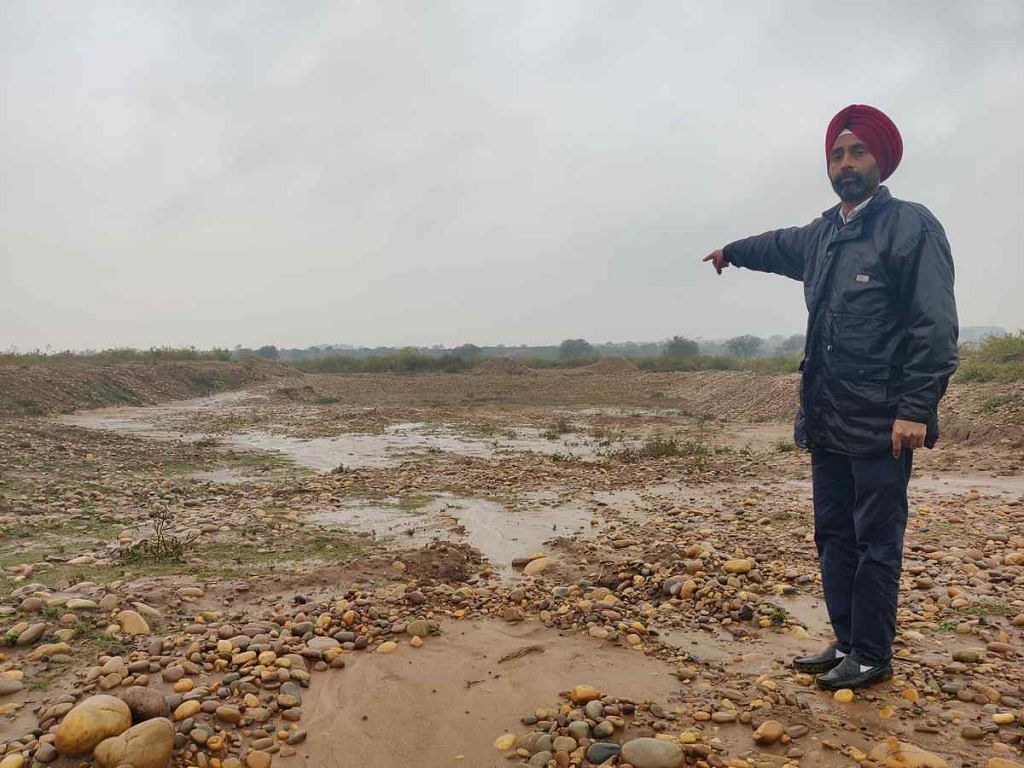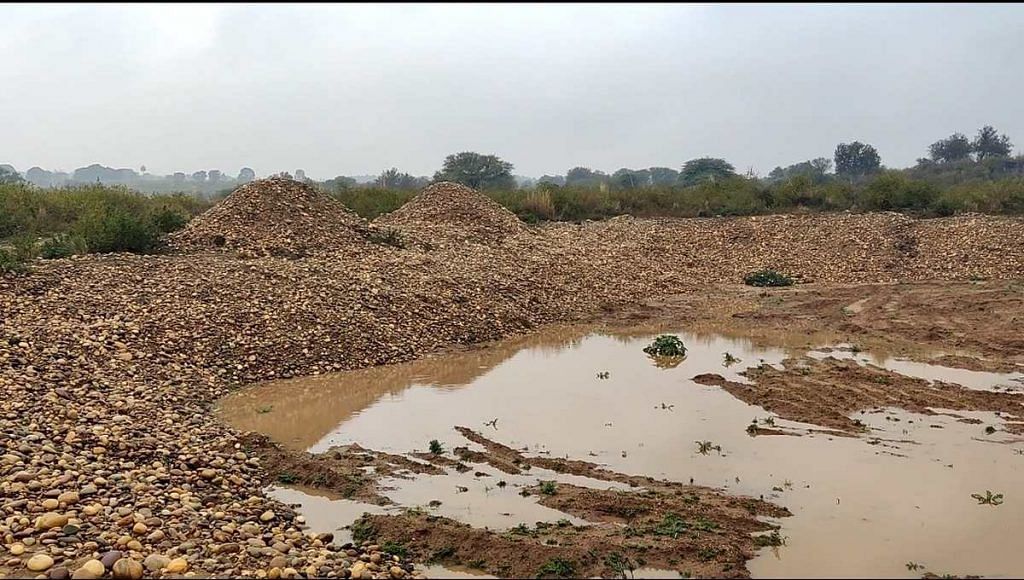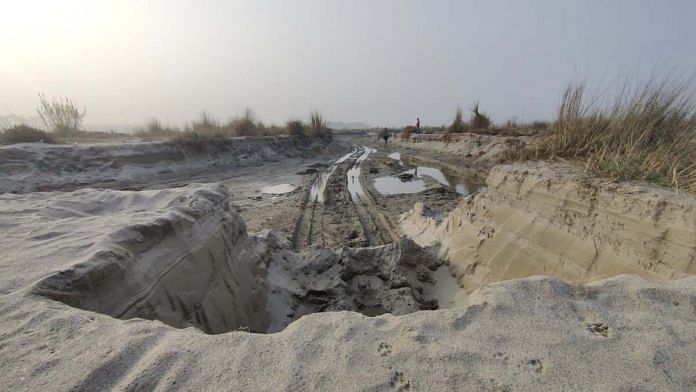Shaheed Bhagat Singh Nagar/Rupnagar: Chandpur Rurki village in Punjab’s Shaheed Bhagat Singh Nagar district has all the trappings of a mining hub, with heaps of stones piled near 15-foot-deep pits. However, none of the sites here are supposed to exist. Chandpur Rurki is just one among many illegal stone/gravel/sand mining sites operating in Punjab.
Sand mining, in fact, has emerged as one of the biggest election issues ahead of the polls next month, with Chief Minister Charanjit Singh Channi in the eye of the storm.
Earlier this month, a raid by the Enforcement Directorate in connection with an illegal sand mining case recovered Rs 10 crore along with gold and other valuables from premises belonging to Bhupinder Singh ‘Honey’, CM Channi’s nephew, and his associates.
Local activists allege that the sand mafia often works in cahoots with the local administration and the government of the day. Advocate R.S. Bains, who is fighting cases against illegal sand mining in the Punjab & Haryana High Court, claimed that the highest authorities in the state are involved. “The sand mafia owns the state cabinet. The state cabinet then makes rules so vague they can be easily bent for illegal activities to be carried out,” Bains alleged.
Devender Singh, Punjab’s chief engineer in-charge of drainage, mining, and geology, declined to comment on the number of cases filed against illegal sand mining operations, or on the specifics of criminal action, when contacted by ThePrint through a phone call. “How do I know?” the chief engineer asked. “Many criminals are walking on the road. Should I go catch them?”
ThePrint visited sand mining sites in Punjab to find out how this illegal activity takes place, why it does, and what local authorities are doing about it.
Also Read: Channi involved in illegal mining, claims SAD’s Majithia with ‘proof’. Punjab CM says ‘baseless’
‘When you make doing the legal thing difficult, illegality flourishes’
In broad terms, sand mining refers to the extraction of sand — for use in construction and manufacturing — from river banks and lakesides, but when done without following norms and guidelines, it can take a severe ecological toll. However, obtaining clearances or complying with rules is not as lucrative or easy as sidestepping or breaking them.
The sand mafia’s modus operandi can vary, but one oft-used method is to extend mining operations beyond government-sanctioned land, according to Paramjit Singh, who is a member of the Kandi Sangharsh Committee, which was formed in 2018 to fight the sand and gravel mafia. “If the government has given permission to carry out mining on a piece of land as big as a car, the mafia mines on the entire garage illegally,” he said.

According to the government’s Sustainable Sand Mining Management Guidelines 2016, sand mining from river banks should be restricted to a depth of 3 metres, or 10 per cent of the river’s width, whichever is less, and that sand or gravel cannot be extracted from within 200 to 500 metres of any crucial hydraulic structure.
ThePrint visited three sand mining sites, and at each of them had pits that were clearly deeper than 3 metres and located very close to the Sutlej River.
“Miners don’t care about this rule. Who is coming here to implement it anyway? They dig holes as deep as 25 feet (7.62 metres) in order to excavate sand,” Makhan Singh, a social worker who works against sand mining, told ThePrint.
According to him, mining is prohibited in the monsoon season, but this is when illegal activity is at its peak. “Nobody stops the mafia operating in the monsoon. That’s when they earn the most amount of money,” Makhan Singh claimed.
Advocate Bains believes that the tight rules around mining have contributed to the problem since it is easier to circumvent than follow them. Legal sites need environment clearances, which can take up more than a year to get processed. It is also necessary to have a mining plan, which has to be mandatorily prepared by someone who either holds a degree in engineering or a postgraduate degree in geology.
“When you make doing the legal thing difficult, illegality flourishes — be it drugs, liquor… anything. Legal procedures are so difficult that honest, hard-working people who are willing to pay royalty to the government can’t function in the environment,” Bains said, adding that if legal sites were easier to operate, then illegal operation would stop flourishing and might even vanish in time.
Cost to the exchequer
The Mines and Minerals (Development and Regulation) Act, 1957, stipulates that any contractor who mines for minerals has to pay a royalty to the government of India. One-third of this royalty, according the Punjab District Mineral Foundation Rules, 2018, must be given to the state government.
Last November, the cost of sand in Punjab was revised to Rs 5.50/cubic feet from Rs 9 earlier. The state government has also reduced the royalty for sand and gravel to Rs 18.25 per tonne from Rs 60 per tonne. A total of 400 lakh metric tonnes of sand and gravel are allowed to be mined in the state every three years according to the Punjab State Sand and Gravel Policy, 2018. If done legally, this would amount to hundreds of crores of royalty every year.
However, illegal mining eliminates the need to pay royalty at all, and to thus make larger personal profits. Activist Bachiter Singh claimed the mining mafia is minting crores of rupees in a single day. “I did a survey two years ago when I was submitting a petition to court. I submitted that the sand mafia is earning Rs 14.5 crore on an average via mining on a daily basis,” he claimed. Bachiter is also contesting elections from Rupnagar as an Independent candidate.
‘Goonda tax’, exploitation of villagers
The sand mafia exploit villagers in a variety of ways, according to activists. One of these is levying a “goonda tax” on the owners of stone-crushers. In essence, the mafia provide raw material with an added “tax” for stone-crushers to turn into gravel.
Activist Makhan Singh, who himself operated a crusher in 2015, said stone crushers are often drowning in loans worth crores of rupees, so they give in to the mafia out of desperation.
A man who runs a stone-crusher in Rupnagar told ThePrint on the condition of anonymity that he pays Rs 3.5/foot to the mafia in order to operate. “If we don’t comply with them, they threaten us. Our family’s lives are at stake. We give them what they want out of fear,” he said.

Rupnagar Deputy Commissioner Sonali Giri said it was difficult to take action against “goonda tax” because nobody files police complaints.
“Oftentimes, stone crushers illegally mine stones themselves, so this entire business is being run by contractors in connivance with the stone crushers. There’s no paper trail. And without FIRs, we cannot take any legal action,” she told ThePrint.
Paramjit Singh said other than levying goonda tax, the mafia take advantage of villagers by offering dubious job opportunities and reneging on agreements. “They offer unemployed youth of villages a tractor trolley with relaxed EMIs and pay them Rs 500 a day plus a bottle of liquor to illegally transport material from the site,” he said.
Landowners are supposed to be paid a compensation of Rs 2 per cubic foot if their plot is mined, but the mafia, of course, don’t follow this rule. “They tell villagers they’ll help remove the stones in the earth and in turn replenish farmer fields with fresh soil. The mafia neither pay the villagers, nor do they replenish their fields,” Paramjit Singh added.
Harassment of activists
Activists who have taken on the mafia allege their complaints are often ignored and that they are frequently harassed, including by the authorities.
Paramjit Singh, who filed a petition in the Punjab and Haryana High Court in 2020, currently has seven FIRs against him, while his father has 10.
Mafia goons also try to bribe or intimidate activists. “Members of the mafia offered me Rs 15 crore to toe the line. I have also been attacked thrice,” Bachiter Singh claimed.
Former CM Amarinder Singh had claimed earlier this month that he knew of 40 Congress MLAs who were involved in sand mining activities. “One of my enduring regrets is why I did not take some of them to task,” he had said. Last May, a Rupnagar mining officer and two of her associates were arrested for accepting bribes, allegedly over a period of years.
What are Rupnagar, SBS Nagar districts doing to curb illegal mining?
The deputy commissioners of Rupnagar and SBS Nagar districts say they are aware of the illegal mining issue and are trying to take measures to curb it.
SBS Nagar Deputy Commissioner Vishesh Sarangal told ThePrint that the district has opened a toll-free number to register complaints against sand mining. Drones are also being sent out to look for illegal mining sites.
A toll-free number has been opened in Rupnagar as well. DC Sonali Giri said the district has made naka (checkpoint) teams that survey roads for trucks, tractors, and trolleys that seem to be carrying suspicious-looking cargo. Naka teams also go to mining sites to ensure rules are being duly followed.
However, DC Giri admitted that Naka teams are only able to catch hold of tractor or trolley drivers, while their bosses stay untouched. “The real kingpins remain elusive,” Giri said.
Nevertheless, Rupnagar district has lodged 130-140 FIRs since January 2021 in relation to illegal mining. “We’ve also told villagers to inform us if any illegal activity happens on panchayat land. Sometimes panchayats themselves are involved in illegal mining of sand, so if complaints of mining on panchayat lands don’t reach us, we take necessary action,” Giri said.
Sarangal added that in SBS Nagar, too, strict action is taken if an illegal site is brought to notice.
Last week, on 21 January, an FIR was lodged against illegal mining at a site in Bair Sal. That day, ThePrint went near the site and noticed that there was illegal activity in the area. Tens of tractor trolleys were waiting 4km from the mining site, and ThePrint spotted three trucks leaving, full of sand. The police nabbed only one truck and filed an FIR against the driver. Another FIR was lodged on 22 January against unnamed persons.
When ThePrint told DC Sarangal about this, he quickly called his sub-divisional officer (SDO) for mining, and asked him to take “strictest action possible”.
(Edited by Asavari Singh)
Also Read: In Haryana tragedy, deadly mix of ‘illegal mining’, disputed leases & a village of dependents



